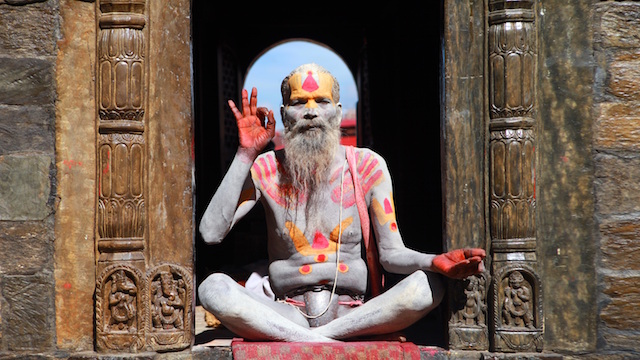
My friend, Jonathan Robinson, loves to tell this delightful story whenever he has the chance. I am not sure how much of it is true and how much of it is fabrication, but either way the story works.
As the myth goes, Jonathan heard about a great teacher in India. He was so impressed with what he had heard that he decided to travel to meet the teacher. Of course, going anywhere in India is inconvenient, so after plane rides and bus rides and rickshaw rides, he ended up meeting the esteemed and venerable swami.
After bowing down in the way customary to Indian culture, this teacher said to Jonathan, “Would you like me to give you the mantra that will set you free forever?”
Jonathan gulped. This was unexpected. Were they really going straight to third base on a first date?
“Yes,” said my friend, “that would be wonderful.”
“Okay,” said the swami. “The mantra that will set you free forever and alleviate all suffering are the words…”
A pregnant pause, a silent drum roll…
“…thank you.”
Another pause of shocked disbelief…
“That’s it?” said Jonathan. “That’s it?”
“No,” said the swami. “Not that’s it. That’s it will create more and more suffering. The mantra is thank you.”
We’ve all heard a lot about gratitude. Just how many Facebook posts have you seen with a neatly piled column of rocks or a perfect golden leaf curled up on the grass, accompanied by an inspiring quote about being grateful? Gratitude has been co-opted by Hallmark greeting cards in much the same way that the American flag has been co-opted by the Tea Party.
But there is deep and liberating truth in what Jonathan’s swami said to him.
A daily practice of gratitude, in my experience, is really the most powerful master switch to flip from the habits of the inquisitive and complaining mind into the vast oceans of generosity and happiness-for-no-reason. My wife Chameli and I like to practice saying thank you after we switch off the light at night. When we are all done with reading or watching the latest episode of Nashville on the iPad, we use that time in the darkness, between switching off the light and falling asleep, to get really creative and innovative with the words “thank you.”
It starts off with fairly obvious things, the blessings that you just cannot help but notice. Thank you for the hot tub we have on our deck, right outside the bedroom window. Thank you for the extremely good wine we drank over dinner. Thank you for the opportunity I had to talk to such wonderful, creative people today.
In this sense we are lucky and very aware that we live lives of such privilege, that we are almost like a Saturday Night Live version of ourselves. But after we get through the obvious causes of thanks, we drop down into all the things we might overlook. For example, Thank you that I got to eat a kiwi today, or kumquat, or an avocado. None of those things grow locally in the area that we live. In fact, I try to eat them sparingly for that reason, and stick to the things that our local farmers grow most of the time. But when I do step out in a gesture of outrageous indulgence and eat an avocado, it is helpful to remember how much work people had to put into getting that avocado to me. People earning much less money than I do had to cultivate the avocado and pluck it from the tree at just the right time. Huge teams of people had to organize themselves to get that avocado properly packed and moved across oceans to be put on a truck and finally delivered to a place where I could pick it out as the perfect avocado for me.
If we add together all of the little conveniences of the day like that, my life, your life, almost everyone we know’s life is far, far, far higher quality than the kings and queens of France just a few hundred years ago. We can say “thank you” for all the people we know, for all the random acts of kindness that have been bestowed upon us. We can say “thank you” for all the parts of our body that are working well. In fact, focusing on those parts of our body that are working well is probably the best way to heal those areas that need some help.
Now we can broaden the thank you to put ourselves within the same context as the other seven billion human beings on the planet. Thank you that drones are not dropping bombs in my particular area of the world today. Thank you that we have running water, thank you that we have sewage, thank you that we have heating in our house. Hey, and while we are at it, thank you that we have a house.
We are long beyond the one percent, baby. We are in the one-in-a-million in terms of having won the jackpot of human incarnation.
But gratitude is not just a feel-good way to quiet the whining mind. Gratitude is a wake-up call, even more powerful than meditation or yoga or chi kung or sitting with any teacher. The only logical, decent and sane consequence to the practice of gratitude is a life devoted to service and creativity.
Gratitude is not so much a pacifier as it is a splash of cold water to remind us that our good fortune is not just an entitlement: it is a responsibility.
If this were a family gathering, and our close relatives were in trouble—not enough to eat, shoes with holes, various health complaints brought on by malnutrition—and if we had a well-stocked fridge and wardrobe and spacious accommodations, we would not hesitate to take care of the people close to us. It is human decency to want to share.
Gratitude wakes us all up to remembering that everyone is our relative through a few degrees of separation, and taking care of them is the fastest route possible to a life of…aaahhh…final and complete peace.
~
Author: Arjuna Ardagh
Image: Ashes Sitoula/Unsplash
Editor: Toby Israel
~


 Share on bsky
Share on bsky




Read 0 comments and reply